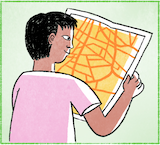


เขากำลังเฮ็ดหญัง กะมีพุซายคนหนึ่ง เขากำลังแนมเบิ่งแผนที่อยู่
เขาแนมเบิ่งแผนที่อี่หยัง อาดสิเป็นแผนที่เมียง แผนที่โลก ปะมานนั้นเนาะ กะมีพื้นที้ใหญ่เติบ หลือว่ากว้างเติบ หลือว่าแนมเบิ่งไปไกเติบ เขากะอาดสิแนมเบิ่งว่าหม้องนี้เมียงอี่หยัง หม้องนี้ปะเทดหญัง หม้องนี้จังหวัดหญัง อำเพอหญัง เขากะอาดสิแนมเบิ่ง
แล้วเขาแนมไปเพี่ยหญัง เขากะอาดสิสึกสาเกี่ยวกับพูมิพาก หลือว่าเกี่ยวกับปะเทดนั้นปะเทดนี้กะได้ เขากะเลยแนมเบิ่ง หลือว่าเขาอาดสิไปเที่ยว หลือว่าไปอาสัยอยู่หั้น ไปอาสัยอยู่นี้กะได้ เขากะเลยแนมเบิ่ง หลือว่าตวดสอบ หลือว่าสึกสาเบิ่งนั้นหละเนาะ ความหมายเนาะ
7
เขากำลังเฮ็ดหญัง กะมีพุซายพุหนึ่งคือเก่านั้นหละ เขากำลังแนมเบิ่งแผนที่อยู่
อันนี้เป็นแผนที่อี่หยัง เบิ่งลักสะนะแล้วหลือว่าเบิ่งซงแล้ว เป็นแผนที่แม่น้ำเนาะ หม้องนั้นเป็น คือสิมีแม่น้ำใหญ่ หลือว่าคองน้ำใหญ่เติบพอสมควน เขากะแนมไปหม้องนั้น
แล้วแผนที่นี้อยู่ใส อยู่หม้องใด กะจักหละเด้อ บ่ฮู้คือกันว่าแผนที่นี้อยู่ใส อยู่หม้องใด
แล้วพุซายคนนี้เขาเบิ่งเฮ็ดหญัง เขากะอาดสิสึกสาเกี่ยวกับหม้องนั้นหม้องนี้กะได้ เขากะเลยเบิ่ง หลือว่าเขาอาดสิไปเที่ยว หลือว่าเขาอาดสิเบิ่งแผนที่เพื่อที่สิเดินทางไปหม้องนั้นหม้องนี้ เขากะเลยเบิ่งกะได้
8
พุหญิงคนนี้เขากำลังเฮ็ดหญัง เขากะกำลังเบิ่งแผนที่ เป็นแผนที่ปะเทดหลือว่าเป็นแผนที่โลกเนาะ เบิ่งลักสะนะแล้ว
อยู่ในแผนที่นั้นกะสิมีแผนที่ปะเทดไทยพ้อม ปัดโทมีแผนที่ปะเทดไทยพ้อมตั๊วะนั้นหนะ
แล้วกะมีแผนที่ปะเทดอื่นพ้อม ปะเทดลาว ปะเทดพะม่า เวียดนาม มีเบิดซู่ปะเทด หลือว่าเอเซียนั้นเองเนาะ เป็นพูมิพากเอเซีย เป็นทะวีบเอเซียเนาะ
แล้วพุหญิงคนนี้เขาเบิ่งเฮ็ดหญัง กะบ่หมั้นใจคือกัน กะบ่แน่ใจว่าเขาเบิ่งเฮ็ดหญัง เขาอาดสิสึกสาเกี่ยวกับทะวีบเอเซีย หลือว่าทะวีบนั้นทะวีบนี้กะได้ แล้วปากดว่าตอนนี้เขากำลังเบิ่งทะวีบเอเซียอยู่นั้นเองเนาะ
Link to overview page
Link to dictionary
| Isaan | Pronunciation | Tones | Thai | English/Notes |
|---|---|---|---|---|
| เขา | khao | M | เขา | personal pronoun: he, she |
| กำลัง | gam-laŋ | M-HR | กำลัง | auxiliary indicating continuous or progressive action |
| เฮ็ด | het | H | ทำ | to do, to make |
| หญัง | ɲaŋ | M | อะไร, เป็นหญัง = ทำไม | 1. what {เขากำลังเฮ็ดหญัง = What is he doing?} {ธูปเอาไว้เฮ็ดหญัง = What are incense sticks for?} 2. something, anything, (nothing) 3. เป็นหญัง[...]คือ in initial position: why {เป็นหญังเขาคือใส่บักพิกลงไปในกวยเตียว = Why is he putting chili in [his] noodle soup?} {เป็นหญังหน้าต่างมันคือเปิด = Why is the window open?} {เป็นหญังมันคือมีควนไฟ = Why is there smoke?} |
| กะ | ga | M | ก็ | 1. then, consequently 2. also |
| มี | mi: | HR | มี | 1. to have 2. there is |
| พุซาย | phu-sa:i | H-HR | ผู้ชาย | man, male |
| คน | khon | HR | คน | person, people |
| หนึ่ง | nʉŋ | H | หนึ่ง | 1. one 2. after adjective: intensifier {บักคักหนึ่ง = very much} {อันบักใหญ่หนึ่ง = very large}, or attenuates the meaning {กะดาดมันแผ่นน้อยๆ หนึ่ง = the piece of paper is [relatively] small} |
| แนมเบิ่ง | nɛ:m-bəŋ | HR-H | มองดู | 1. to look at 2. to watch |
| แผนที่ | phɛ:n-thi: | M-H | แผนที่ | map |
| อยู่ | yu: | H | อยู่ | 1. to be (located) at 2. yet, still 3. auxiliary indicating continuous or progressive action {ทอดปาอยู่ในกะทะ = (in the process of) frying a fish in the pan} {แม่กำลังเมี้ยนเฮียนอยู่ = mother is cleaning/tidying up the house} |
| อี่หยัง | i:-yaŋ | H-M | อะไร | 1. what {นี้คืออี่หยัง = What is this?} {มื้อนี้เจ้าเฮ็ดอี่หยัง = What are you doing today?} {กินเข้างายกับอี่หยัง = What did you have for breakfast?} 2. something, anything, (in negations) nothing {บ่ต้องเฮ็ดอี่หยังอีกเลยนอกจากใส่ปุย = [we] don't need to do anything besides adding fertilizer} |
| อาด | a:t | LF | อาจ | 1. might, may, will 2. likely |
| สิ | si | M | จะ | future tense auxiliary {เขากำลังสิตื่น = he's about to wake up} {สิไปตะหลาด = [I'm] going to the market} |
| เป็น | pen | M | เป็น | 1. to be, to exist 2. to be able to 3. to suffer, sth. happens to 4. เป็นหญัง[...]คือ in initial position: why? {เป็นหญังเขากะคือแปงฟัน = Why is he brushing his teeth?} {เป็นหญังเคี่ยงบินมันคือสิตก = Why is the airplane falling down?} |
| เมียง | mi:aŋ | HR | เมือง | town |
| โลก | lo:k | HF | โลก | world, earth |
| ปะมาน | pa-ma:n | M-HR | ประมาณ | 1. about, approximatively 2. to guess, to estimate |
| นั้น | nan | HF | นั้น | that, there |
| เนาะ | nɔ | H | เนาะ | final particle: makes the statement softer, looking for agreement |
| พื้นที้ | phʉ:n-thi: | HF-HF | พื้นที่ | area |
| ใหญ่ | ɲai | H | ใหญ่ | large, big |
| เติบ | tə:p | LF | intensifier: very, much {เว้ากันโดนเติบ = to talk a long time} | |
| หลือ | lʉ: | M | หรือ | or |
| ว่า | wa: | H | ว่า | 1. that, as {คำว่า X = the word X} 2. to say |
| กว้าง | gwa:ŋ | HF | กว้าง | large, wide, broad |
| ไป | pai | M | ไป | 1. to go 2. auxiliary indicating action extending into the future |
| ไก | gai | M | ไกล | far, distant |
| หม้อง | mɔŋ | LF | ที่, แห่ง, บริเวณ | 1. place, area {หลายที่หลายหม้อง = in many places} {หม้องใดหม้องหนึ่ง = some place} 2. clf. for places |
| นี้ | ni: | HF | นี้ | 1. this 2. here |
| ปะเทด | pa-thet | M-HF | ประเทศ | country {ปะเทดไทย = Thailand} |
| จังหวัด | jaŋ-wat | M-M | จังหวัด | province |
| อำเพอ | am-phə: | M-HR | อำเภอ | district |
| แล้ว | lɛ:o | HF | แล้ว | 1. finished 2. already 3. and then, and next (especially แล้วกะ) 4. auxiliary for past tense |
| แนม | nɛ:m | HR | มอง | to look, to glance, to stare {เขากำลังยืนแนมก้อนหินอยู่ = he's standing and looking at the stone/rock} {ข้างหนึ่งแนมเห็น อีกข้างหนึ่งแนมบ่เห็น = [we] see one side, [we] can't/don't see the other side} |
| เพี่ย | phi:a | H | เพื่อ | for Notes: alternative pronunciation of เพื่อ |
| สึกสา | sʉk-sa: | M-M | ศึกษา | to study |
| เกี่ยวกับ | gi:ao-gap | H-M | เกี่ยวกับ | about, regarding, pertaining to |
| พูมิพาก | phu:-mi-pha:k | HR-H-HF | ภูมิภาค | region, provinces |
| ได้ | dai | HF | ได้ | 1. can 2. to get, to obtain 3. before verb: indicating past tense 4. บ่ได้ + verb: not |
| เลย | lə:i | HR | เลย | 1. futher on, beyond, past {เข็มน้อยเลยเลขสิบสองไป = the minute hand has passed number twelve} 2. too much 3. at all 4. definitively 5. completely, utterly |
| เที่ยว | thi:ao | H | เที่ยว | 1. to travel 2. to go out |
| อาสัย | a:-sai | M-M | อาศัย | 1. to live, to reside, to settle {ซ้างมันอาสัยอยู่ใส = Where do elephants live?} 2. to use |
| หั้น | han | LF | ที่นั่น | there, over there |
| ตวดสอบ | tu:at-sɔ:p | LF-LF | ตรวจสอบ | to check, inspect, verify, investigate, examine |
| เบิ่ง | bəŋ | H | ดู | 1. to look at, to see, to watch {เบิ่งโทละทัด = to watch TV} {เบิ่งหนัง = to watch a movie} 2. to guess {เบิ่งซงแล้ว ... = [I] guess / from what it looks like ...} |
| นั้นหละ | nan-la | HF-M | นั่นแหละ | auxiliary for emphasis at the end of a phrase |
| ความหมาย | khwa:m-ma:i | HR-M | ความหมาย | meaning |
| พุ | phu | H | ผู้ | 1. person 2. clf. for people {พุหญิงพุหนึ่ง พุซายพุหนึ่ง = a woman, a man} {ซู่พุซู่คน = everybody} {พุหนึ่งโตจ่อยๆ พุหนึ่งโตบักอ้วนหนึ่ง = one person is slim, the other is fat} Notes: pronunciation: also realized as พู่- |
| คือเก่า | khʉ:-gao | HR-H | as before | |
| อัน | an | M | อัน | 1. thing, object 2. general clf. for objects |
| ลักสะนะ | lak-sa-na | H-M-H | ลักษณะ | feature, characteristic, quality |
| ซง | soŋ | HR | ทรง | 1. shape, form 2. as if, like Notes: translation to be confirmed |
| แม่น้ำ | mɛ:-na:m | H-HF | แม่น้ำ | river |
| คือ | khʉ: | HR | คือ | 1. to be, to resemble, like, as 2. why {บักหล้าคือบ่เก็บโต่ะแน่ = [addressing a young boy] Why haven't you cleared the table?} |
| คอง | khɔ:ŋ | HR | คลอง | canal |
| น้ำ | na:m | HF | น้ำ | 1. water 2. drink, soft drink, juice |
| พอสมควน | phɔ:-som-khu:an | HR-M-HR | พอสมควร | moderately, fairly, rather |
| ใส | sai | M | (ที่)ไหน | 1. where? {สิไปใส = Where are [you] going?} {มาแต่ใส = Where are [you] coming from?} {กะทะอยู่ใส = Where's the pan?} 2. somewhere, anywhere {ใสกะได้ = anywhere, wherever you like} |
| ใด | dai | M | ใด | 1. which, that one which, what, how {เขานั่งแบบใด เขานั่งขดตะหมาดอยู่ = How is he sitting? He's sitting cross-legged.} {ตอนใด = when?} 2. whichever, whoever {หม้องใดหม้องหนึ่ง = some place, somewhere} {ขั้นเฮาอยากตื่นญามใด เฮากะตั้งเวลาปุกญามนั้น = If we want to get up at a certain time, we set the alarm to that time} Notes: sentence-final often with a marked rising tone |
| จัก | jak | M | จัก | 1. answer to a question: [I] don't know, don't know exactly, [I'm] not sure {พุซายคนนี้เขาเถ้าไป่ จัก จักเถ้าหลือบ่เถ้า เบิ่งบ่ค่อยออก = Is this man here already old? I don't know. I can't see clearly whether he's old or not.} {เขาเว้ากันอยู่ใส จักคือกัน = Where are they talking? I don't know either.} 2. exact(ly), what exactly {จักต้มอี่หยังกะบ่ฮู้ = I don't know what (exactly) he is cooking} {บ่ลู้คือกันจักปาอี่หยัง = I don't know either what kind of fish this is} 3. how much/many? {ต้นไม้มีจักต้น = How many trees are there?} {ตอนนี้จักโมงแล้ว = What time is it now?} {มือของเฮานี้สิมีจักนิ้ว = How many fingers do our hands have?} 4. a bit, a little bit {จักหน่อย/จักหน่อยหนึ่ง = a bit, a little bit} |
| หละ | la | M | แหละ, ล่ะ | 1. auxiliary for emphasis at the end of a phrase 2. auxiliary to create a follow-up question: And what about ... ? {แล้วลดคันที่สองหละ = And what about the second car?} |
| เด้อ | də: | HF | final particle | |
| บ่ | bɔ: | H | ไม่ | 1. no, not 2. question particle, transforming a statement into a question Notes: spelling exception in line with common usage on social media |
| ฮู้ | hu: | HF | รู้ | 1. to know 2. to understand Notes: equivalent to ลู้ |
| คือกัน | khʉ:-gan | HR-M | เหมือนกัน | 1. also, likewise, similarly {ยินดีที่ได้ฮู้จักคือกันคับ = Nice to meet you too!} 2. in negative sentences: either {บ่ลู้คือกัน = I don't know either} {จักคือกัน = I don't know (either)} |
| เพื่อที่ | phʉ:a-thi: | H-H | เพื่อที่ | in order to, so that Notes: the vowel เอือ is likely to be a Thai loan |
| เดินทาง | də:n-tha:ŋ | M-HR | เดินทาง | to travel, to make a journey/trip |
| พุหญิง | phu-ɲiŋ | H-M | ผู้หญิง | woman, female |
| ใน | nai | HR | ใน | in, within |
| ไทย | tha:i | HR | ไทย | Thai {ปะเทดไทย = Thailand} {คนไทย = Thai (person)} |
| พ้อม | phɔ:m | HF | พร้อม | at the same time, also, too {มีตะเว็นพ้อม = the sun's out, too} {กะทะมีด้ามพ้อม = the pan has also a handle} |
| ปัดโท | pat-tho: | M-HR | โอโห | exclamation of surprise Notes: can be drawn out to ป๊าด-ถิ-โท, or otherwise (with possible tone changes) |
| ตั๊วะ | tu:a | HR | particle: intensifies meaning {กะไปตั๊อะ = Of course I go!} {กะฮู้ตั๊วะ = Sure I know!} Notes: pronunciation: also realized as ตั๊ว (long) |
|
| นั้นหนะ | nan-na | HF-M | final particle: for emphasis | |
| อื่น | ʉ:n | H | อื่น | other |
| ลาว | la:o | HR | ลาว | Lao |
| พะม่า | pha-ma: | H-H | พม่า | Myanmar |
| เวียดนาม | vi:at-na:m | HF-HR | เวียดนาม | Vietnam |
| เบิด | bə:t/bət | LF/M | หมด | 1. completely, totally, entirely {เทิงเบิด = all of them} {เบิดมื้อเบิดค่ำ = [all] day and night} {ขั้นพุโดยสานลงลดไฟเบิดแล้ว [...] = when all passengers have disembarked […]} {เขากินเบิดบ่ = Has he eaten all of it?} 2. to be finished, to be exhausted, to come to an end, to have no more {โน่ดบุ่กแบ็ดเบิด = the notebook is out of battery/the notebook needs recharging} |
| ซู่ | su: | H | 1. all, entire 2. every, any {ซู่พุซู่คน = everybody} {ซู่สิ่งซู่อย่าง = everything} {ไก่ต้องกินเข้าซู่มื้อ = chicken need to eat every day} {ซู่คนสิมีขาเอาไว้ถ้าญ่าง = everybody has legs to walk} |
|
| เอเซีย | e:-si:a | M-HR | เอเชีย | Asia |
| นั้นเอง | nan-e:ŋ | HF-M | นั่นเอง | 1. there 2. sure enough 3. emphasizes that the preceding is the topic or has been mentioned before Notes: Thai loan |
| ทะวีบ | tha-vi:p | H-HF | ทวีป | continent |
| หมั้นใจ | man-jai | LF-M | มั่นใจ | to be sure, confident, certain |
| แน่ใจ | nɛ:-jai | H-M | แน่ใจ | to be sure, confident, certain |
| ปากด | pa:-got | M-M | ปรากฏ | 1. to appear, seem 2. to happen |
| ตอนนี้ | tɔ:n-ni: | M-HF | ตอนนี้ | now |